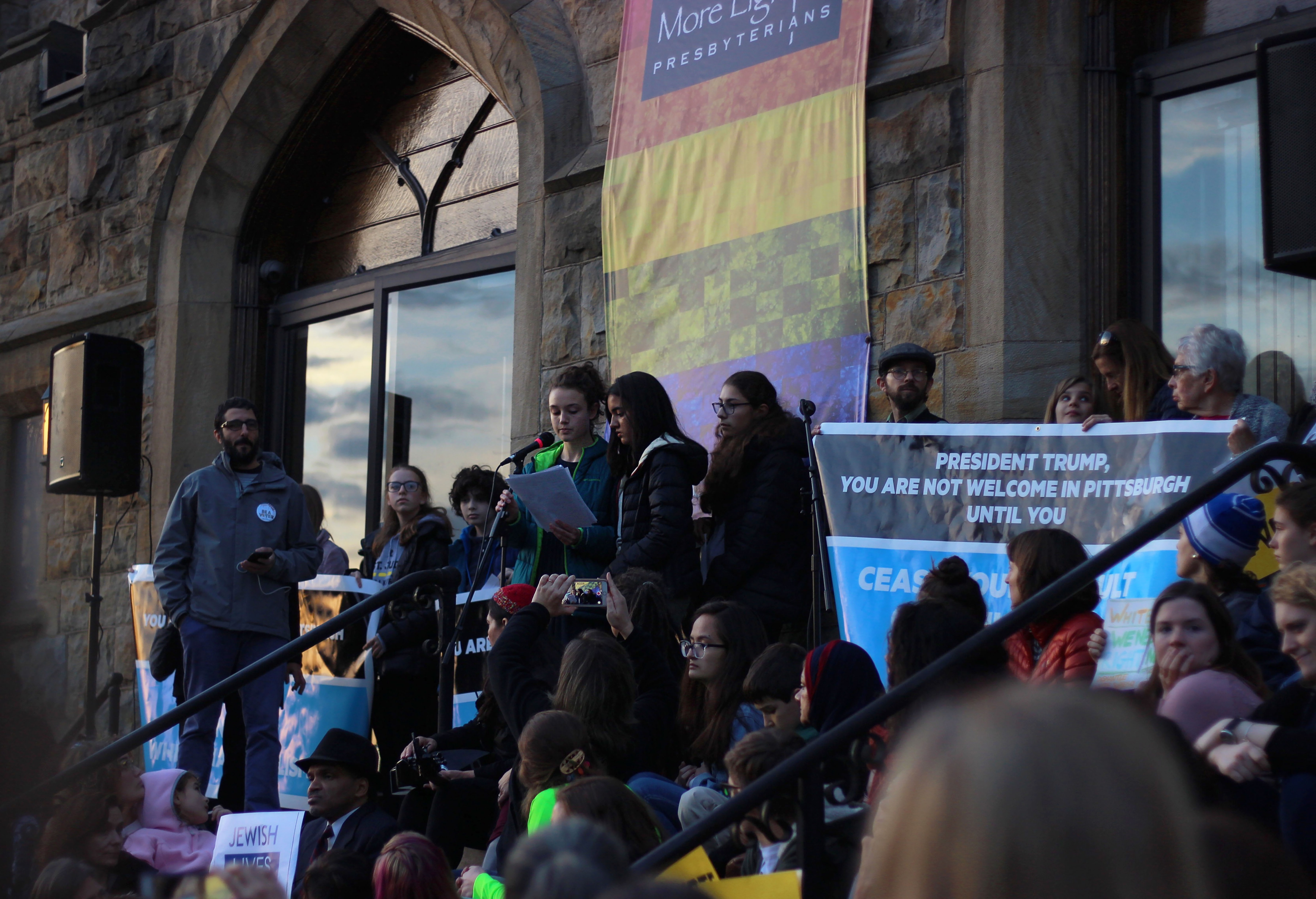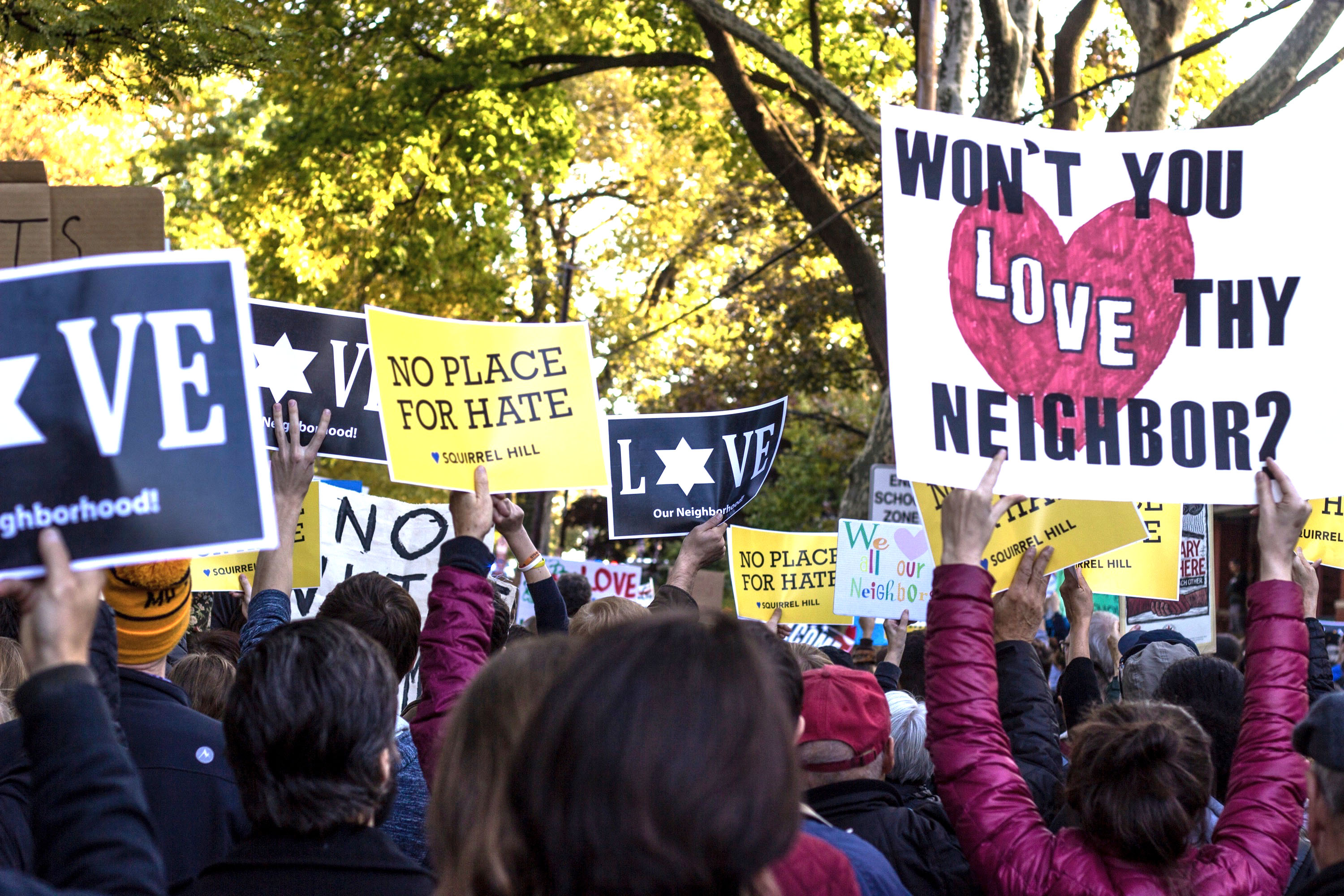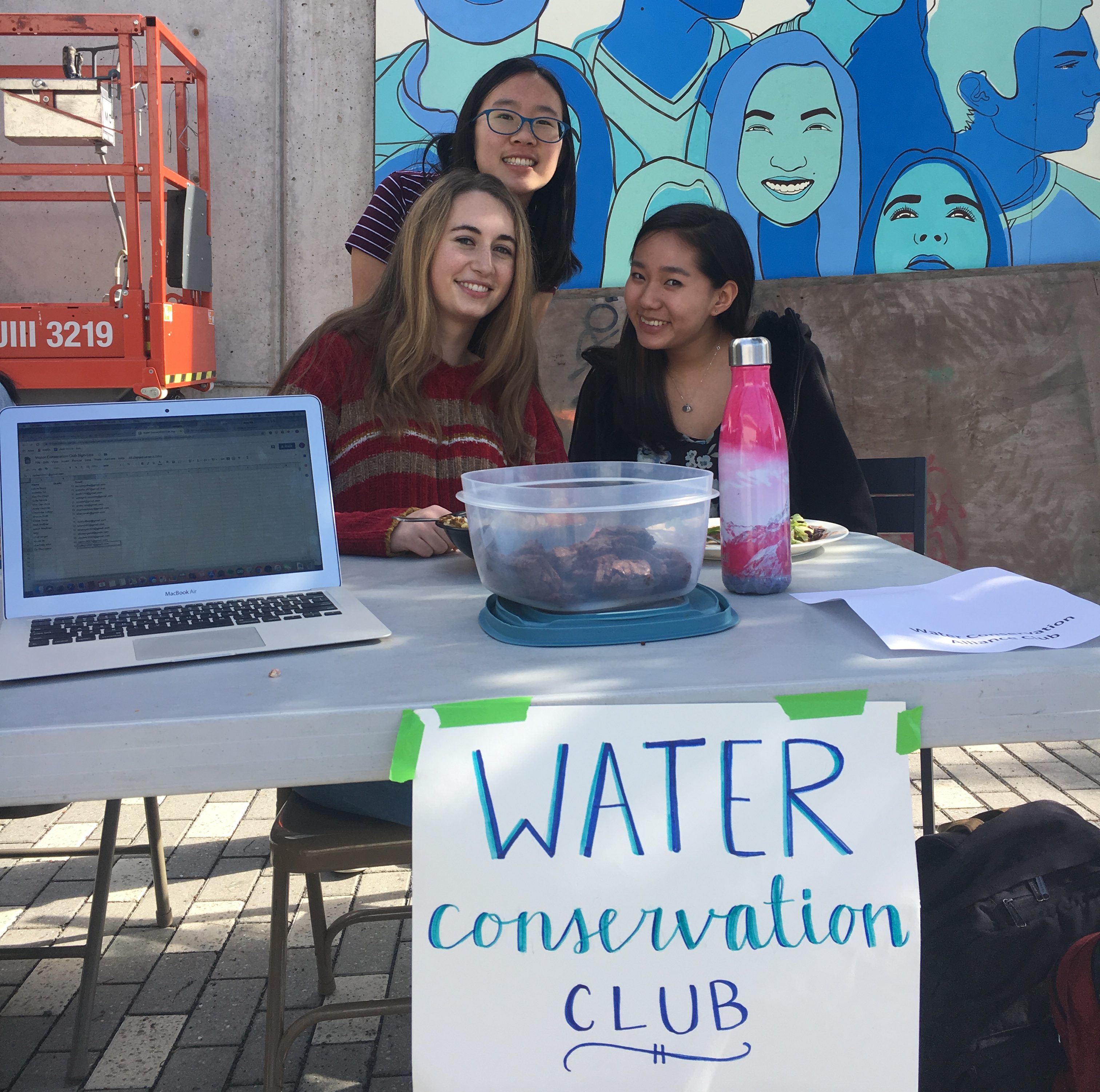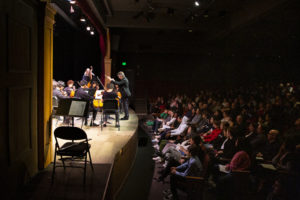On October 27, 2018, Simone Rothstein, a senior at The Ellis School from the Squirrel Hill neighborhood in Pittsburgh, Pennsylvania, walked to synagogue with her father, like she does every Shabbat.
Rothstein attends synagogue about three blocks from the Tree of Life Synagogue in Squirrel Hill. At the intersection nearing Tree of Life, Rothstein and her father heard sirens. Police in full SWAT gear and an armored truck blazed by.
Rothstein and her father finished the walk to their synagogue to alert their congregation that, according to a pedestrian, “someone with a gun ran into Tree Of Life.” Upon arriving, they were told that their own synagogue was in lockdown and that they could not leave the building until notified by police. Rothstein and her family identify as Conservative Jews: they strictly observe Shabbat and abstain from using technology on Saturdays. However, they ran to the synagogue office to call their neighbors and asked them to tell Rothstein’s younger brother not to leave the house.
Locked in the building, congregants began to learn that eleven people at Tree of Life had been killed in the worst attack against Jews in American history.
“We just sat and we davened [prayed],” Rothstein said. “People started to get information.”
As news poured in regarding victims, Rothstein said she “just would hope… this really deep and painful hope. Because you can’t really give up on that.” Congregants would cry out: “One person shot. A police officer shot. A congregant shot. Oh my god, he’s holding hostages. One person dead. Two people dead,” Rothstein said.
“Everyone knows everyone in the Pittsburgh Jewish community so you knew that there was no way you could get out of this experience without losing someone you knew.”
“All these adults were just like sobbing and crying and wailing,” Rothstein said. “You can’t even leave your own building, because you don’t even know if you are safe in your own building. You don’t know if your friends are safe outside.”
There was a vigil that night and a larger one the next day. “That following week it was just like funeral after funeral after funeral,” Rothstein said. “That was the first funeral I’d ever gone to.” Her mother went to “five or six” funerals that week.
The synagogue shooting in Pittsburgh was followed by two more: on April 27, 2019 one person was killed and three were injured during Shabbat services at a synagogue in Poway, California. On July 28th, 2019, a man was shot outside of a Miami synagogue while waiting for afternoon services.
Anti-Semitism in America is on the rise.
“My life and the life of this community was completely different,” Rothstein said, “There was a before and an after… It feels like [the shooting] was this new, horrible beginning. That’s the beginning of an onslaught of anti-Semitic incidents.”

Just before the one-year anniversary of the shooting at Tree of Life, the American Jewish Committee (AJC), a global advocacy group, released an extensive survey of American Jews. 84% of those surveyed said anti-Semitism has increased over the past five years. 47% of Jews surveyed have been targets of anti-Semitic attacks.
In 2018, reported assaults against Jews more than doubled, and these near-historic levels of recorded incidents have continued into 2019. Just last week, on December 10th, six people died in an attack at a Kosher grocery store in Jersey City, New Jersey.
Jewish teenagers are living these statistics. Maturing in a time when it is increasingly dangerous to be Jewish, young Jews are standing firm in their identities, combating hate daily in their communities and beyond.
For Rachel Leykin, a senior at Morris Knolls High School, a public high school in the small town of Denville, New Jersey, hearing anti-Semitic remarks is “just a very normal part of the day.” Leykin, the daughter of Russian-Jewish immigrants who identifies as secularly and culturally Jewish, is one of the few Jewish young people in her school and her town.
Leykin retraced her experiences with anti-Semitism throughout her educational career. “In elementary school, this kid would call me a Holocaust,” she said. “As I go to middle school, I get pennies thrown at me as a joke.” In high school, a student in her International Baccalaureate program did his historical investigation project on “the benefits of Nazi experiments.”
Leykin recalls hearing this student, who she knows to be particularly anti-Semitic, frequently make jokes, “You know, the way people make your mom jokes? He’s just like ‘Holocaust,’ ha-ha.”
The Bay Area is not immune to anti-Semitism. On April 18, the locker of Ilan Rosenbaum, a junior at Burlingame High School in Burlingame, California, was vandalized with a swastika and a homophobic slur.
Rosenbaum said, “I’ve talked to the principal, I’m still talking to the principal, I’m trying to get something done. I’m trying to get an anti-hate program to be created.”
Then, on the early morning of September 5, someone spray-painted anti-Semitic, homophobic and racist graffiti all over the Burlingame High campus, including swastikas and slurs. A 20-year-old Burlingame High School alum was arrested in early October on charges of felony vandalism and hate crimes. The San Mateo Unified School District and the Anti-Defamation League assisted the Burlingame Police Department with the investigation.
As incidents have increased, so have security efforts. Elinadav “Davi” Frank, a senior at the SAR school in Riverdale, New York City, said that since the attack in Pittsburgh, his Modern Orthodox school and synagogue now have a member of the New York Police Department standing guard.
Ben Haberman is a Reform Jew and a senior at Rancho Bernardo High School, a public school in Poway, California. He attends a synagogue located “a minute” from the synagogue where the shooting took place in April. Since then, his synagogue has become a “fortress.” “[The police] have made it so only one car can come in every minute through these giant flaps,” Haberman said.
“It makes me sad that they have to be there,” Haberman said. “It makes it feel real.” Students expressed fear regarding visible expressions of their Judaism. Frank recalls taking the bus home late at night with his friend, who is also Jewish: they immediately took off their kippot, small ritual head coverings, and tzitzit, knotted ritual fringes worn under shirts—most often by Orthodox men. “I think it’s just something that is so ingrained in us in our minds,” Frank said of his Modern Orthodox community. “We have to protect ourselves and not necessarily identify ourselves as Jewish.”
Julian Bertet, a Conservative Jew and son of European and French-Moroccan parents, is a senior at North Hollywood High School, a public school in Los Angeles, California. Bertet wears a Jewish star necklace every day, which he tucks into his shirt. He’s hesitant to identify as Jewish outside of his school. “I am not going to give people a reason to hurt me,” Bertet said.
Sometimes when Bertet is wearing a kippah after synagogue, he said he worries about being targeted. Bertet said, “I know that people could have hatred towards me, not because they know me or because of something I did…They don’t know who I am as a person or what my values are. They just know that ‘oh he’s Jewish.’”
For Rothstein, the fear of being targeted is ever-present after the shooting at Tree of Life. Rothstein said she feels the emotional effects of the shooting every day. She has felt “more of a distinction between me in my identity as a Jew and most of American society…I feel more isolated.”
Rothstein is now the only Jewish student in her grade.
Students emphasized efforts to fight against anti-Semitism by engaging with the world proudly as Jews. Frank said that when he and his peers went to the New York City Youth Climate Strike, they made sure to wear their kippot, to show that “we are committed Jews who are here for progress and who are here to change.”
“I have this newfound appreciation for my privilege to just go outside and scream that I am Jewish,” Rothstein said. “That is amazing, and something that our ancestors were not able to do. And I try to remember that when I am not feeling very hopeful.”
For non-Jews, Leykin suggests that the best way to fight anti-Semitism is by asking questions. “I had this guy ask me once ‘why do Jews not like being Jewish’ and then we had this whole conversation about anti-Semitism,” she said.
Bertet, Haberman and Rothstein have each founded organizations and initiatives in their communities to combat hate.
After the shooting in Pittsburgh, Bertet founded the Blue Ribbons Campaign, a social media platform for spreading a message of inclusivity and intolerance regarding anti-Semitism.
“The ultimate goal of the Blue Ribbons Campaign is to spark awareness that anti-Semitism did not end with the Holocaust,” Bertet said. “It’s perpetuating itself in swastika vandalisms and Holocaust jokes and heils— I’ve encountered all of those things in high school. I have just felt more empowered to call that out.”
Following the Poway shooting, Haberman founded an anti-hate program with three other students at his school through the Anti-Defamation League. “I think the two best ways to combat anti-Semitism is to uplift your community and create interfaith connections built on knowledge,” he said.
For Rothstein, the shooting at Tree of Life “verified in my life the importance of social justice action but more specifically the collaboration between marginalized groups as a way to combat hate.”
In 2017, her sophomore year of high school, Rothstein and her best friend Aniya Akhtar founded the Pittsburgh teen chapter of Sisterhood of Salaam Shalom, a national network for Muslim and Jewish women to build bridges across communities and unify against hate and prejudice.
Rothstein has also been active with Bend the Arc, a national Jewish action group aimed at combating white nationalism.
Bend the Arc organized a protest when President Trump visited Squirrel Hill after the shooting. The President’s visit “felt like an attack because Trump endangers Jews,” Rothstein said, likening the chronology of his presidency with the sharp rise in anti-Semitic attacks. “He enabled all these white supremacists to come out of the woodwork.”
At the protest, Rothstein and Akhtar spoke to thousands of people about their friendship, the importance of interfaith community relations and the violence that white nationalism spawns.
Rothstein ended the speech: “If we never forget the names of the people lost, and never forget the impact they had on our community we can grow a better neighborhood, and people from that neighborhood will go out and grow a better city, and the people from that city will go out and grow a better country, and the people from that country will make a better world.”






